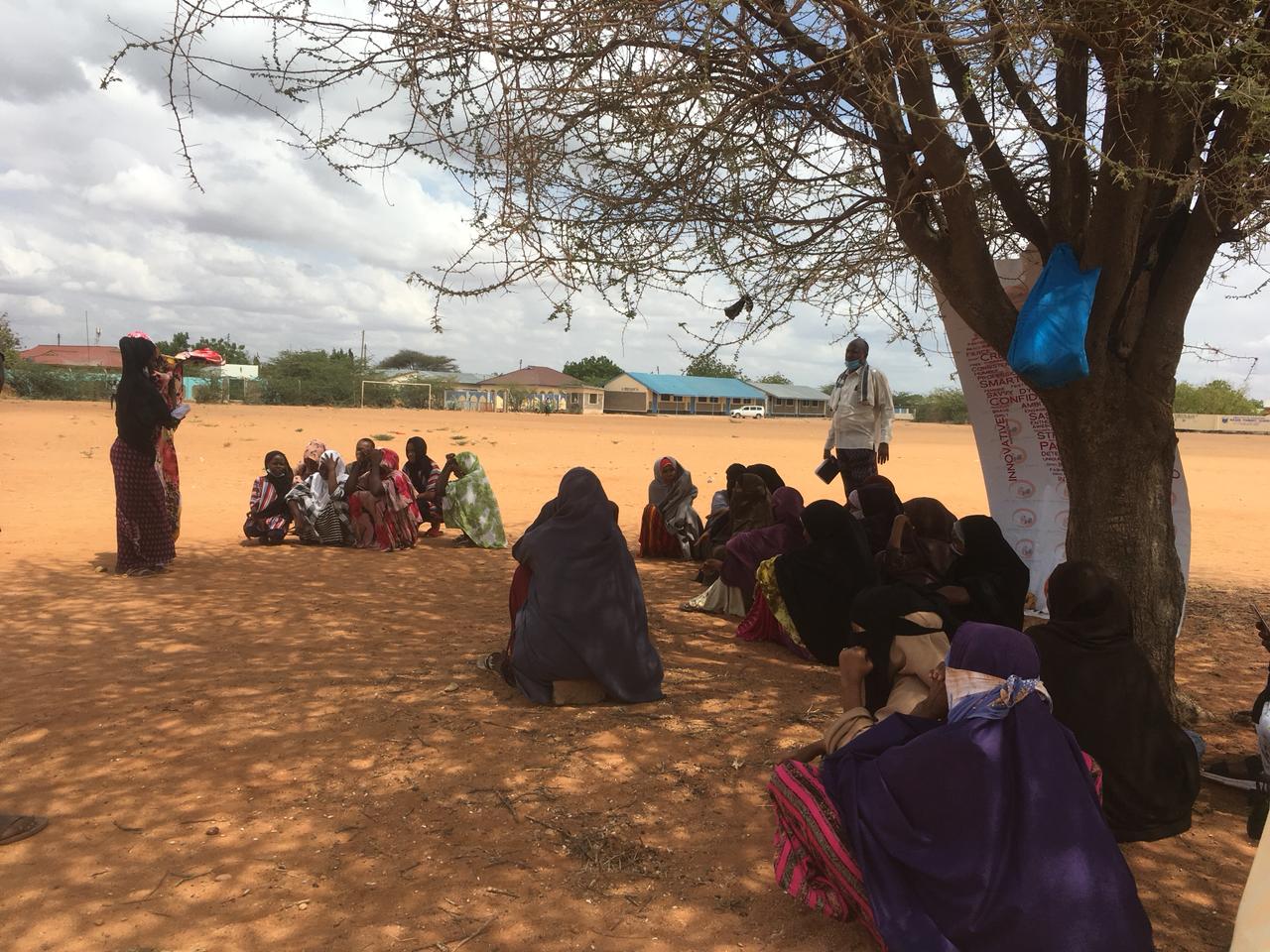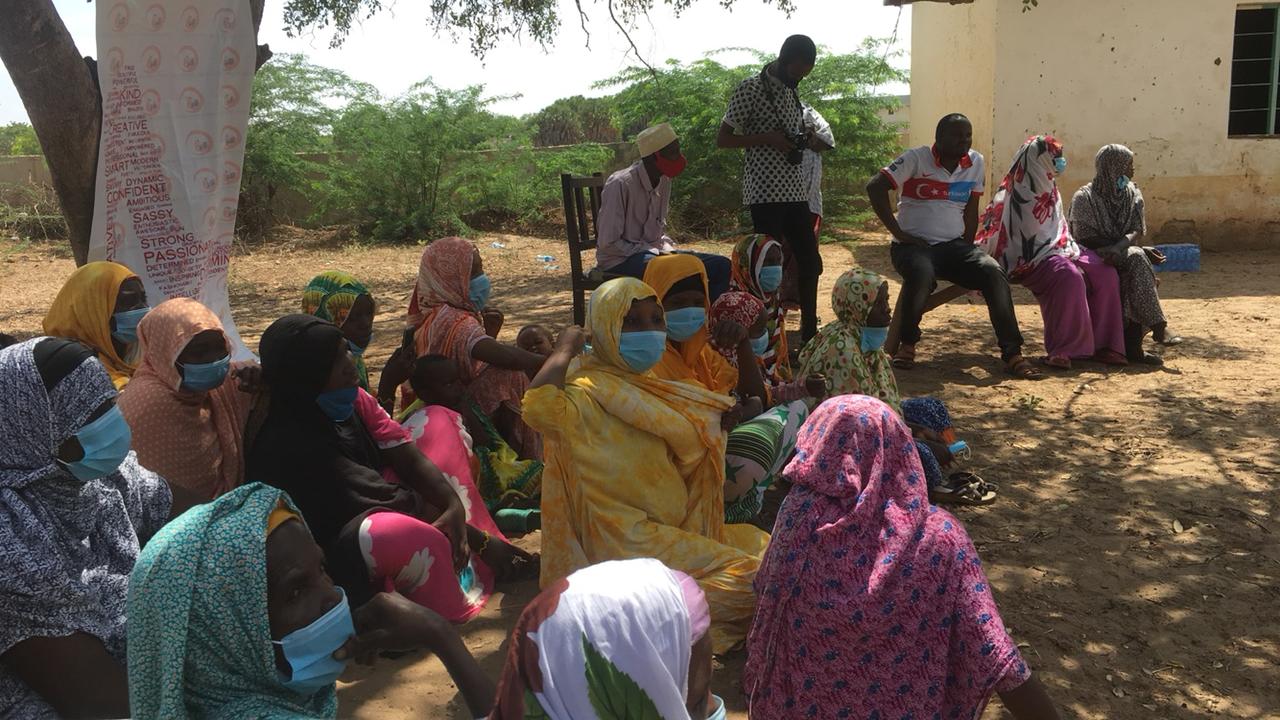
“Saada and Suleina are sisters living in a community where child marriages are still practiced. The two sisters are school going teenagers but their parents decide to marry them off, in line with the community’s customs. The marriage plans and procedures are concluded, making Saada and Suleina wives to two men in the community. But that did not last long for Saada, thanks to her relentless will to be educated. She boldly defines her parents and the community, walking away from her marriage to pursue her education. She secures a scholarship guaranteeing her to continue her education away from her home. All this time, Saada has tried convincing her sister Suleina to follow suit but she declines, citing her adherence to community norms.
Saada does not give up on herself, she pursues her education and becomes a nurse. Because she wanted to advocate for the importance of education, she returns home where she is employed in one of the leading community health centers. One of her patients is her sister Suleina, now a mother. Suleina is surprised to find her sister as a nurse at the health centre. Saada passionately attends to her sister, like all of her patients. For Suleina, her under-education has posed many challenges. She can neither read the prescriptions of her medicine, nor can she administer medicine in the right way to her children. She can hardly read or write. Saada hopes her example will show the people in her community, how education can break the chain of poverty and allow girls to follow their dreams”
Saada and Suleina were characters in a play scripted and acted by 11 children from Garissa, Kenya. Living in a community where child marriages are rampant, these children wanted to pass a message to raise awareness of this harmful practice.
“Seeing our peers get married is what made us want to address this issue because we live in this community and us too are under pressure to get married” – Salma, 16 years
 The children observed that poverty was a major catalyst leading to child marriages. They explained that most parents would opt to marry off their daughters in order to ease the burden of providing for many children. Additionally, the parents would receive a bride price from the marriage, which they thought would alleviate poverty for them. The children noticed that the Covid-19 pandemic had made matters worse. More girls were being married off during the time schools were closed as a result of the pandemic. Most of these girls came from poor backgrounds and from families who could not afford adequate nutrition, let alone support their children’s online learning. Marrying them was a way to reduce their family’s economic burden. As a result, the communities have seen a drastic reduction in the number of children attending schools, especially girls. The children leading this project had observed that in some parts of the community the children, especially girls, hardly go beyond basic primary level of education.
The children observed that poverty was a major catalyst leading to child marriages. They explained that most parents would opt to marry off their daughters in order to ease the burden of providing for many children. Additionally, the parents would receive a bride price from the marriage, which they thought would alleviate poverty for them. The children noticed that the Covid-19 pandemic had made matters worse. More girls were being married off during the time schools were closed as a result of the pandemic. Most of these girls came from poor backgrounds and from families who could not afford adequate nutrition, let alone support their children’s online learning. Marrying them was a way to reduce their family’s economic burden. As a result, the communities have seen a drastic reduction in the number of children attending schools, especially girls. The children leading this project had observed that in some parts of the community the children, especially girls, hardly go beyond basic primary level of education.
“Art breaks the barriers of formal communication and sticks in one’s mind.” – Mohamed, 17 years
This was the leading thought the children had in their mind when they chose to use drama to implement their project as a way to raise awareness on child marriage. The 11 children coming from different backgrounds organized three theatre sessions in different communities in the area. Their 35-45 minutes of acting carried a heavy message on the need to shun child marriage and provide equal educational opportunities for all children, as a way to break the shackles of poverty. The children acted for an audience of 25 people, comprising of community and religious leaders, villagers as well as parents and caregivers. The community and/or religious leader would then engage the spectators in a dialogue following the children’s drama play, reinforcing the message of the children and appreciating the children’s creativity to pass this important message.
“Many community members wanted to be part of the physical audience but we settled at only 25 participants because we were keen not to defy the public health protocols regarding Covid-19.” – Zeitun, 16 years
However, Covid-19 was not the only challenge the children and their adult supporters faced. For some members in the community seeing children as able to bring in information and important teachings was difficult to accept. Some adults felt that the children could not possibly tell them anything new or were qualified to educate adults on community matters. Despite negative attitudes from some adults in the communities, the children stuck together and remained relentless in enlightening their communities on the need to educate children in order to break the cycle of poverty and uphold the rights of children. The community leaders were a great help in countering negative attitudes and were at the defense of the children whenever such challenges arose.
Throughout the project, the children were supported by Silver Lining Kenya, an organization based in the region of Garissa, Kenya. The supporting adults from Silver Lining highlighted the need to educate the community members on the wellbeing and rights of children and the consequences of violating those rights already beforehand, to address some of the challenges faced.
While working with the children, the Silver Lining team, led by Benazir Mohamed discovered the power of letting the children be at the forefront of implementing projects, as they do so with such enthusiasm, authenticity and genuineness:
“In the implementation of projects, we have viewed kids as recipients that should not be part of developing and implementing, but this has changed. Having them involved we have seen the critical role they play.”
The coordinator of the project from Silver Lining, Ms. Benazir Mohamed further noted, that “sometimes we (adults) shy away from implementing, but children make it easier, they make it work and they will work towards goals.”
She continued to highlight the importance to keep nurturing the children, supporting them and engaging them: “Treat them as your own children, listen to them. Sometimes children are more informed than us, let’s see how they can best inform us.”
This project is part of the Children’s Solutions Lab programme, inaugurated last year by Arigatou international through its initiatives; End Child poverty and Ethics Education for Children. The Lab has aimed to create meaningful spaces for children to address poverty through solutions focused on education. True to its definition, Silver lining acknowledges that their community understood the role and need of child participation in implementing projects, such as raising awareness on child marriage.
“The moment you bring children on board when implementing a project, it becomes even easier than we think because children are friendly to work with.”
Ms. Benazir Mohamed, Silver Lining.


